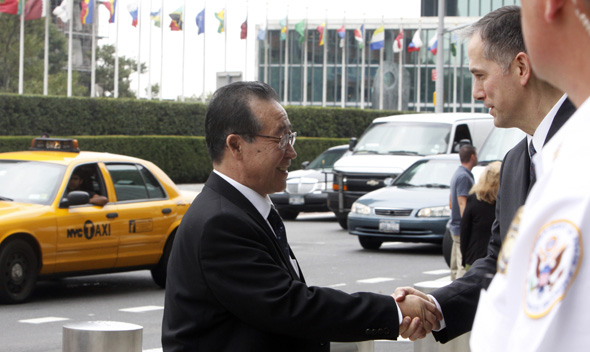A Six-Step Formula for Resumption of Six Party Talks
More on:

Since before the sinking of the Cheonan in March of 2010, the People’s Republic of China has been pushing a three-step formula for resumption of Six Party Talks: resume inter-Korean dialogue, resume high-level U.S.-DPRK contacts through a visit by Vice Minister Kim Kye-gwan to the United States, and reconvene Six Party Talks in Beijing. The first two steps were accomplished in relatively short order at the end of July with a surprising meeting between the foreign ministers and chief negotiators of the two Koreas in Bali on the sidelines of the ASEAN Regional Forum and a visit by Kim Kye-gwan to New York a week later for two days of informal dialogue with U.S. officials, including Special Representative Stephen Bosworth, Special Envoy for Six Party Talks Clifford Hart, and Special Envoy for North Korean Human Rights Robert King. Although the State Department labeled these talks “exploratory and preliminary,” the North Korean side described the talks as “negotiations” while KCNA re-initiated a propaganda campaign calling for a Peace Treaty to end the Armistice.
The next step in the Chinese-formulated three-step plan would be the resumption of Six Party Talks in Beijing, but it seems doubtful that the third step will come as quickly as the first two have proceeded. In fact, there are at least three missing steps in the Chinese three-step plan that must be pursued before it would be possible, in my view, to return to the Six Party Talks, and even then it will be politically impossible for the United States to negotiate a nuclear deal with North Korea that follows the template of the U.S.-DPRK Agreed Framework or the September 19, 2005, Six Party Joint Statement. For this reason, I am advocating a six-step plan for returning to Six Party Talks. The missing steps are as follows:
First, it will be necessary to develop a plan to provide assurance that inter-Korean relations will be fully stabilized as part of the path toward resumption of Six Party Talks. At this stage, a single inter-Korean foreign ministers’ meeting is insufficient grounds upon which to provide assurance that the inter-Korean relationship is stable. There are obvious steps that the North needs to take, including addressing its responsibility for provocations in 2010—and especially the needless shelling and civilian casualties at Yeonpyeong Island—that have escalated tensions between the two sides. The North needs to address this matter directly as a step toward stabilizing the relationship. The North has been influenced not to respond to South Korean exercises on the island last December, and Pyongyang has reversed its categorical disavowal of dialogue with the Lee Myung-Bak administration within weeks by holding an inter-Korean foreign ministerial meeting on the sidelines of the ARF and ending a public propaganda campaign against the Lee Myung-Bak administration. If the North can be persuaded to meet with South Korean counterparts weeks after having publicly disavowed such a possibility, the North should also be persuaded that its own acknowledgement and regret for loss of life deriving from its own actions is a necessary and reasonable step to take before meaningful six party negotiations can be resumed.
Second, the North must show its commitment to denuclearization through action. By calling for an unconditional return to talks on the basis of the status quo ante without undoing the things it has done to further develop its nuclear and missile programs, the North seeks implicit recognition of its nuclear status while attempting to change the subject from denuclearization to peace. It is incumbent upon the North to act first to reestablish in some measure the status quo ante before it will be possible to rebuild trust.
Third, the United States and China must affirm that they share the same objectives and priorities for Six Party Talks before it is possible for the Six Party Talks to resume. Following the Yeonpyeong shelling last November, the Chinese call for an emergency meeting of Six Party envoys revealed its own misunderstanding that the purpose of the Six Party Talks was to manage crises and avoid tensions, when in fact the fundamental purposes of the talks as represented in the Six Party Joint Statement are normalization of relations and denuclearization of the peninsula. This emergency Chinese proposal gave the impression that it is enough to use Six Party Talks as the venue for managing crises without addressing the root causes of crises, in which case the Six Party talks might go on in perpetuity without successfully addressing the shared objectives embodied in the 2005 Six Party Joint Statement. Without confirmation that the United States and China share the same objective of denuclearization, it is not hard to imagine that the United States could face pressure from China to accept North Korea as a nuclear weapons state as a basis for defusing tensions and proceeding with talks. A prerequisite for the success of the Six Party talks clearly is that the United States and China need to be on the same page in terms of objectives and outcomes associated with the talks.
If these three steps can be accomplished, it would be justifiable to proceed with Six Party Talks, but absent these three prerequisites, an early return to Six Party Talks would be more likely to affirm North Korea’s status as a nuclear weapons state than to provide the pathway for North Korea’s denuclearization.
More on:
 Online Store
Online Store
